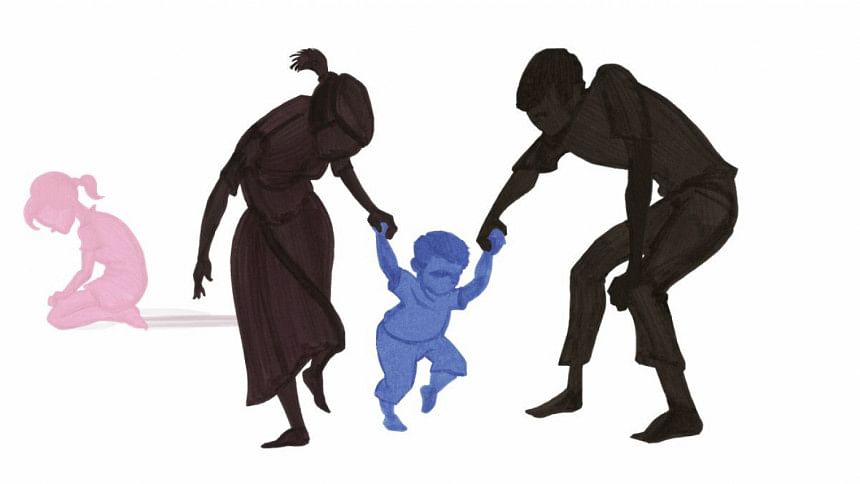On sexism, son preference and female infanticide in Bangladesh

On July 30, a father in Narayanganj burned his nine-month-old female infant alive since he "wanted a son" and was enraged at the birth of a girl ("Father 'wanted son', burns baby girl alive", The Daily Star, August 4, 2017). He poured petrol over the child when she was asleep and set her on fire. He then switched on the fan to let the fire spread and stopped the mother from helping the child or taking her to the hospital reported a leading online news site.
While it is appalling and abominable that a practice as medieval and barbaric as female infanticide still takes place in our country, it should not come as a surprise. In fact a similar incident took place only two months ago when a man from Satkhira, Khulna threw his two-week-old daughter into the pond since he too wanted a son and was disgusted by the birth of a daughter ("Father kills 15-day-old infant for being female", Dhaka Tribune, June 9, 2017). Last year, a man from Abhayngar, Jessore poured poison into his three-month-old daughter's mouth while she was asleep because he was craving the birth of a son and could not bear having a daughter for the fourth time ("Father kills daughter", The Independent, March 2, 2016).
Killing new born daughters (i.e. female infanticide) is not a random, inexplicable act of violence; it is an extreme manifestation of a pre-existing and deeply sexist societal mindset known as "son preference" which still plagues a sizeable portion of our population today. A 2006 study of 850 families conducted by Promoting Human Rights Education in Bangladesh showed that 93 percent of Bangladeshi families preferred a son, viewing them as a "blessing" to the home and country, while 93 percent viewed girls as a "problem." ("Son Preference", Stop Violence Against Women, The Advocates for Human Rights). So it is not enough or even helpful to simply admonish the perpetrator (necessary as that may be), we must also look at the wider scheme of things and force an introspection: what socioeconomic factors cause certain people to cherish the birth of a son but loathe the birth of a daughter—sometimes loathe to the extent of killing their own flesh and blood—and what are we, as a country, doing to tackle this insidious mentality and its component causes?
In South Asian culture the birth of a son is celebrated because boys are seen as custodians of the family who will secure the family's future by providing economic security and ensuring the continuity of the male line. Conversely, the birth of a daughter is an impediment to this continuity since our culture dictates that upon marriage a girl must take up her husband's name, permanently leave her family and move in with her in laws. As such, the birth of a daughter is considered "a burden" because the family must protect her "honour", and when the time comes, find a husband willing to marry her and provide a hefty dowry to incentivise the marriage (or rather "transfer of burden"). The practice of dowry runs rampant despite it being outlawed in Bangladesh by the Dowry Prohibition Act 1980. Indeed, going back to the Narayanganj case, Jahirul himself had taken Tk 1 lakh as dowry from his wife.
Given their inevitable departure from the family and the price that must be paid, educating girls (or educating them on par with their male siblings) is not seen as a sound investment. This mindset is encapsulated in the old and notorious Asian expression which warns: "educating a daughter is like watering another man's garden". Rather paradoxically, it is our own sexist and cultural practices which deny a girl the same opportunities as a boy which in turn eternalises her financial dependence on male kin but the girl is then blamed for "being a burden" as though it was of her own doing. How can we feasibly assess a girl's worth when we do not even allow her to realise her full potential to begin with?
In her book Gender Roles: A Sociological Perspective, Linda Lindsey explains how female infanticide and neglect are associated with the economic survival of the family, which is dependent on the number of sons and control of the number of daughters, who are regarded as financial liabilities. She further explains that a major shift in favouring males in the average sex ratio at birth (SRB) is growing throughout Asia and rural Bangladesh is among the places with the worst SRB imbalances.
In 1990, Amartya Sen coined the term "missing women" to denote the shortfall in the number of women relative to the expected number of women in a region or country. This shortfall is usually measured through male-to-female sex ratios (such as SRB), and is theorised to be caused by sex-selective abortions, female infanticide. According to a study by the University of Kent, there are approximately 2.7 million missing women in Bangladesh ("Missing Women and Bare Branches: Gender Balance and Conflict", ESCP Report, Issue 11). The study also found that gender imbalance in Asia is primarily the result of son preference and the profound devaluation of female life. The futility of the Dowry Prohibition Act in curbing the practice of dowry illustrates how legal change alone cannot remedy cultural malpractices; societal change must also follow.
Why must we wait till a female child is burnt or drowned alive to address the deep-rooted sexism and son preference which pave the way for barbaric practices such as female infanticide to occur? Every time we encounter anyone stating or doing something which is even remotely sexist or anti-women, we should call them out and retaliate. Indeed, change begins at home and change begins with us. We must attack sexism whenever we see it, from whomever we see it and in whatever shape or form we see it.
Taqbir Huda is currently working as a research officer at Bangladesh Institute of Law International Affairs (BILIA) and volunteers at Bangladesh Society for the Enforcement of Human Rights (BSEHR- Manabadhikar).





Comments